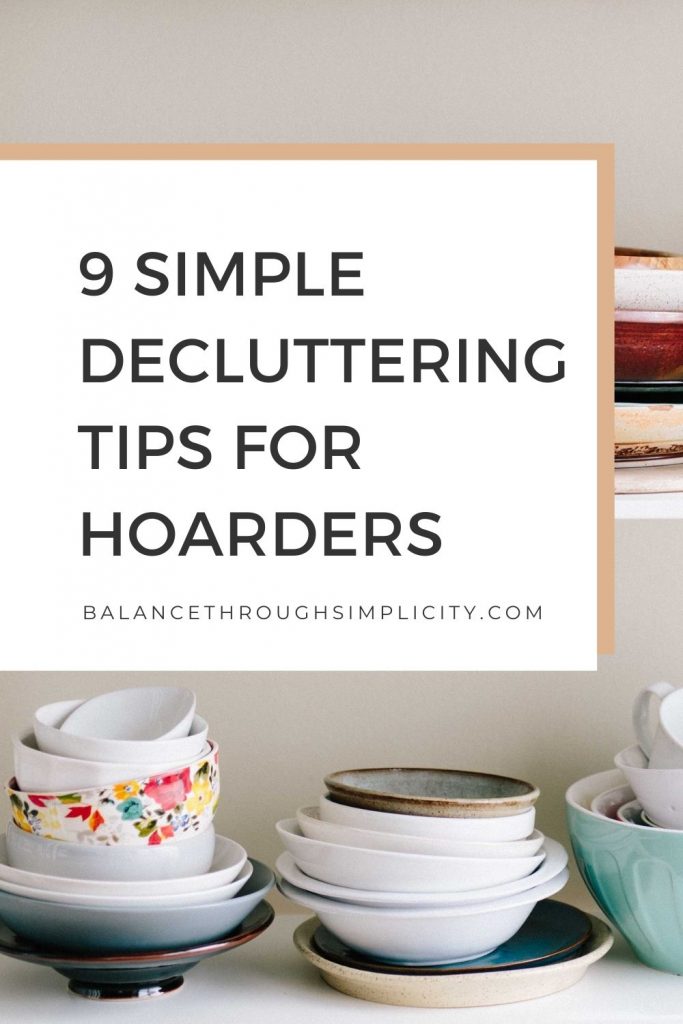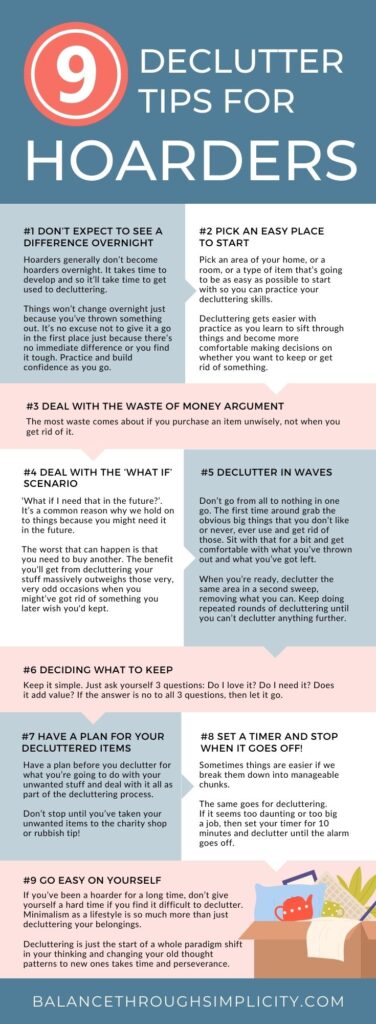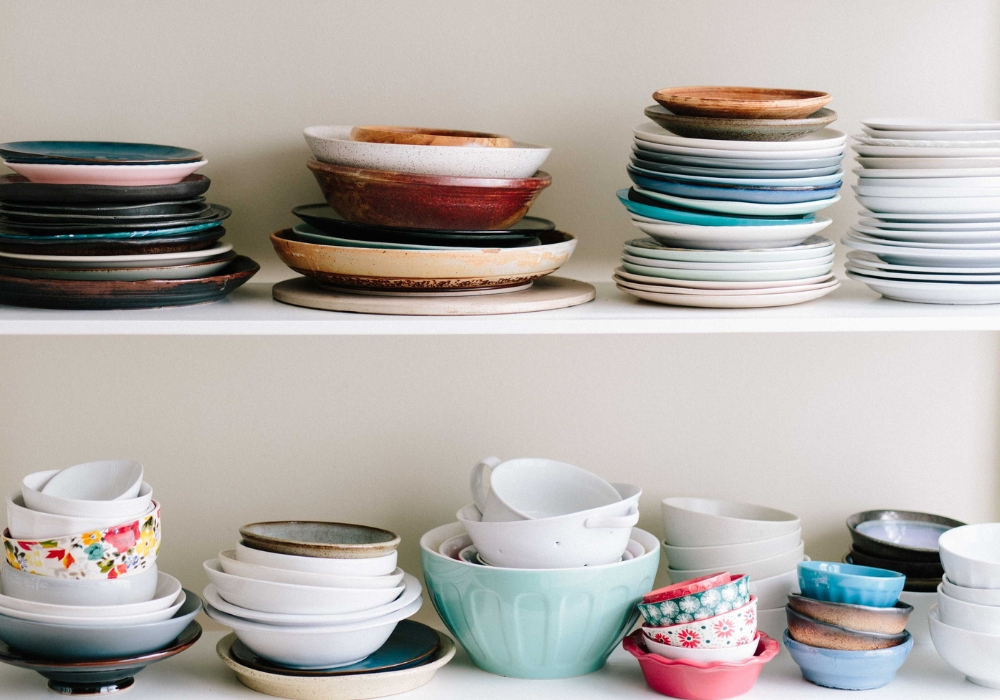9 DECLUTTERING TIPS FOR HOARDERS TO HELP YOU GET RID OF STUFF
Decluttering can be difficult for many of us. Knowing what to keep and what to let go of isn’t always a simple choice. If you’re prone to hoarding, or live with a hoarder, the sheer scale of the task can seem overwhelming. Here are some easy strategies and 9 decluttering tips for hoarders.
DECLUTTERING ISN’T ALWAYS EASY
The honest truth is that decluttering isn’t always easy. It’s not always as simple and straightforward as keeping whatever ‘sparks joy’, is useful or adds value in some way.
Decluttering can be tough for some, particularly when you have a lot of stuff which you don’t want to get rid of.
We hold on to our clutter for a variety of reasons – fear, security, attachment. Clearing that clutter means facing up to some complicated emotions, let alone the physical act of sorting through our stuff.
If you struggle because you’re a hoarder, or you live with a hoarder, here are 9 decluttering tips for hoarders which I hope may help!
DECLUTTERING AND KIDS
Decluttering when you have kids, particularly little kids who love toys and collecting things, is quite a challenge. How well it goes and how much success you have, both in the process and sustainably for the future, depends very much on how you approach the whole decluttering process.
Tell your kids that you’re throwing out over half of their toys and not letting them have any new toys, ever, is not the way to go if you want a stress-free decluttering experience and happy children!
For some tips on decluttering with your children and their stuff (my kids are mini-hoarders), here are a couple of articles which might help:
DECLUTTERING AND MY HUSBAND
I had the same problem with my husband who is a collector, a hoarder, a ‘what if,’ ‘just in case’ sceptic who doesn’t like change. He couldn’t really see the benefits of clearing our space and getting rid of stuff we’d spent money and time accumulating.
To be fair, he works long hours so it’s mostly my job to run the home and look after the kids. The full impact of decluttering our home and making it easier and quicker to get everything done, and then simplifying the rest of my life in the same way, was pretty much lost on him… apart from the fact that he noticed I was happier and the immense knock-on effect for the rest of our family!
So, when it came to me announcing to my family that I was trialling out what I’d learnt about the scientific effects of clutter on stress by decluttering my home, my family thought I was nuts. They gave it a go for my sake, but we had a few challenges and frustrations along the way.
So, using the benefits of my trial and error and learning how to approach the whole decluttering process with my own family of hoarders, here are some simple decluttering tips for hoarders.

DECLUTTERING TIPS FOR HOARDERS
If you (or someone in your home) struggle with getting rid of stuff, here are some gentle decluttering tips for hoarders. Try them out, slowly and gently and see what works best for you!
1. Don’t expect to see a difference overnight
If you’re a hoarder, you might well be a little sceptical of the benefits. Hoarders generally don’t become hoarders overnight. It takes time to develop and so it’ll take time to re-learn old habits.
If you expect to see a magical difference to your physical space and mental well-being, then you need to give it a little time. Things won’t change overnight just because you’ve thrown something out, and it’s no excuse not to give it a go in the first place just because there’s no immediate impact.
Declutter some items and give it time to see how you feel about letting these things go. Get comfortable with the idea that decluttering isn’t about getting rid of stuff, ticking it off your To Do list and never doing it again. Sustained, consistent efforts will build up a decluttering habit that supports you in the long-term.
2. Pick an easy place to start
If you’re new to decluttering or find the process difficult or emotional, then make it easy on yourself. Admit that you find decluttering a challenge, that you’re easily going to be side-tracked or put off. Prepare yourself for decluttering with these 11 simple things to do before you start decluttering.
Then start decluttering in an easy place. Pick an area of your home, or a room, or a type of item that’s going to be as easy as possible to start with so you can practice your decluttering skills. Decluttering gets easier with practice as you learn to sift through things and become more comfortable making decisions on whether you want to keep or get rid of something.
I always suggest the bathroom is a good place to start as it’s not full of sentimental items to hold you up, you know what you use and what you don’t and it doesn’t tend to be a massive space with huge storage areas so you can get it done relatively quickly and efficiently. Don’t start with somewhere notoriously tough like the attic or garage! Try these tips on how to declutter your bathroom.
Decluttering is largely to do with confidence. Confidence that you’re doing something difficult right now but for long-term gain. Confidence that you can make real and positive change even if it feels tough. Confidence that the decisions you’re making are the right decisions for you. Starting somewhere easy will help build this confidence.
3. Deal with the ‘what if’ scenario
‘What if I need that again?’ my hoarder husband would ask. It’s a common reason why we hold on to things in case we might use it or need it in the future.
I always think it’s best to deal with this question head-on with an honest answer. I can’t honestly say to my husband that I’ve never needed something that I’ve got rid of. The worst that can happen is that you need to buy or borrow another. But that happens so rarely that I don’t even think about it.
The benefits I receive from decluttering my stuff massively outweigh those very, very odd occasions when I’ve got rid of something I later wish I’d kept. And, I’ve got decluttering down to a fine art so I know what I’m throwing out (or donating) and what items I’m keeping.
If something is high value, difficult to replace and I’ve used it a lot (but not just at the moment) then I’ll think long and hard about getting rid of it. Just weigh up in your own mind whether you really, really value that item enough to keep looking after it.
If decluttering is scary because you’re wondering about the ‘what if’, go slow and be gentle. You don’t need to get rid of everything right now, slow baby steps will help you achieve the same end result, albeit a bit slower. However, if it makes the process feel more comfortable and more sustainable, then a slower pace will work better in the long-term.
Read this post on how to declutter when you feel overwhelmed.
4. Declutter in waves
Which brings me on to my next top tip. Don’t go from all to nothing in one go. Try decluttering in waves.
The first time around grab the obvious big things that you don’t like or never, ever use and get rid of those. Sit with that for a bit and get comfortable with what you’ve thrown out and what you’ve got left. When you’re ready, declutter the same area in a second sweep, removing what you can. Keep doing repeated rounds of decluttering until you can’t declutter anything further.
Sometimes we get scared off or overwhelmed by decluttering because it feels big. Getting rid of things that are familiar in our homes can feel final, especially when we do it in a big way. If decluttering feels difficult for this reason, then start slow and small. Just one book from your overstuffed book shelf, just one ornament from your window sill.
Get comfortable with removing that one item and come back to it another day and remove another. Remove everything all in one go and you might find yourself sifting through the donation bag because it’s a step too far!
5. The waste of money argument
Some people say that decluttering your home is a waste of money and they use this argument to avoid decluttering. I personally disagree and think that the most waste comes about if you purchase an item unwisely, not when you get rid of it. Check out my post on Minimalism and shopping if you keep buying things you don’t really want or need.
I like to donate most of my unwanted stuff so even if I am getting rid of it, I know someone else will have some benefit. Very occasionally I do have to buy something which I’d previously decluttered but this happens so rarely. Decluttering my home has given me so many benefits that I don’t ever regret throwing something out. I just put it down to one of those things and move on.
6. Knowing what to keep and what to get rid of
This is always a tricky one for decluttering beginners and it does get easier with practice. But, if you’re a hoarder, this can be a really big stumbling block to stop you from decluttering. My suggestion would be to keep it really simple.
Just ask yourself 3 questions:
- Do I love it?
- Do I need it?
- Does it add value to your life in some way?
If the answer is no to all 3 questions, then let it go.
For more information on knowing what to declutter, check out this post I wrote on how to decide what to declutter.
7. Have a plan for your decluttered items
Once you’ve put all your effort into decluttering, don’t undo this hard work by leaving your unwanted items lying around. Not only will they still be cluttering up your space, but you might be tempted to dig around and pull out a few things!
Have a plan before you declutter for what you’re going to do with your unwanted stuff and deal with it all as part of the decluttering process. Don’t stop until you’ve taken your unwanted items to the charity shop or rubbish tip!
For more tips, read this post on what to do with unwanted stuff you’ve decluttered.
8. Set a timer
Sometimes things are easier if we break them down into manageable chunks. The same goes for decluttering. If it seems too daunting or too big a job, then set your timer for 5 or 10 minutes and declutter until the alarm goes off. A few minutes each day will be better than not doing it at all, and as I’ve said before, decluttering takes practice. You’ll get more efficient and find it easier, the more you do it.
You might like to read this article on how to declutter fast for some handy little tips!
9. Go easy on yourself
If you’ve been a hoarder for a long time, it may take a while for you to adapt to a new way of thinking about your stuff and what you do with it. Old habits die hard.
Remember why you’re decluttering and if you’re not clear on your why then grab a notebook and make some notes right now. We often make decisions based on how we feel so HOW do you feel about your life (and your home) right now, WHY do you want to declutter and WHAT do you want it to do for you?
When you get stuck with your clutter, go easy on yourself and turn back to your answers and remind yourself of your ‘why’.
Another way of being easy on yourself is to reward yourself if you’ve completed a decluttering project. This doesn’t mean you can go out and buy loads of clutter again but go out and have fun with the kids, treat yourself to takeaway pizza instead of having to cook. Decluttering isn’t meant to be a form of punishment but instead of way of bringing more ease, less stress and more freedom into your life so have fun with it too!
A NOTE ON STAYING CLUTTER-FREE
There are so many different types of clutter. Clutter can be sneaky and it invades our homes, schedule, inbox and life in many different ways. That’s one of the reasons that hoarders find it difficult to be clutter-free. Getting rid of your stuff in the first place is one thing, but keeping it away is another.
Staying clutter-free requires adopting a decluttering mindset, changing old habits, existing ways of doing things and breaking away from familiar patterns of behaviour that have made us feel safe and comfortable up until now. These are all major components of what makes some of us have a tendency to hoard so it’s a question of implementing small, daily changes to help us make sustainable, long-term change.
One of the ways to do this is by having some habits and strategies in place to help you maintain a clutter-free home, without the stress and hassle.
Further reading: 20 daily habits for a clutter-free home
The other way to do this is to think differently about the stuff in your life. Shifting your mindset with a minimalist mindset.
RESOURCES ON DECLUTTERING
I hope you enjoyed these decluttering tips for hoarders. Here are some other articles which you might find helpful:
- How to declutter your home and life – a complete guide to clearing clutter and keeping it away with simple tips and extra resources to help and inspire you!
- Declutter Starter Kit – a free workbook to help you start decluttering your home, schedule, heart and mind.
- How to declutter other people’s stuff: 6 helpful tips
- How to declutter when you don’t have time
- 20 reasons to own less stuff
- Essential mindsets to help you get more out of life – hoarding often comes down to mindset more than stuff. Here are some ways that our mindset affects our choices and decisions in simplifying life.
- 100 things to get rid of right now – a free printable to give you some quick wins
DON’T MISS OUT!
I’m Antonia and on this blog I share practical inspiration to simplify your home, time and life. Follow me on Instagram, Facebook and Pinterest! You can also subscribe to Balance Through Simplicity and receive regular simplicity tips straight to your inbox for free. Make sure you never miss an article plus you’ll get a copy of my free Declutter Starter Kit as a welcome gift!
Save this to Pinterest to read later!



Laura
Monday 1st of January 2024
Fun fact: research suggests that there's a high correlation between hoarding and ADHD. That might be why I have so many boxes to unpack right now! Thank you for this thoughtful and compassionate article.
Balance Through Simplicity
Monday 1st of January 2024
Hi Laura, That's interesting. Another example of how understanding our mindset and thoughts affect our choices and actions. This is why it's good to understand 'why' we keep stuff before we try to deal with it. It may not seem like a quick and easy way of getting rid of clutter, but taking the time to do the sometimes difficult inner work is key to knowing how to approach our stuff. Thank you for sharing that!
Fay
Wednesday 2nd of October 2019
I really appreciate that you should make sure you create a plan and use a timer to be able to declutter. My mom has a problem with hoarding things, and I think she would benefit from professional help. I think I will make sure I talk to her about it so she can go easy on herself, as you also mentioned.
Balance Through Simplicity
Wednesday 20th of November 2019
I think it's important to remember that little steps will get you to the end goal. Just do what you can, when you can!